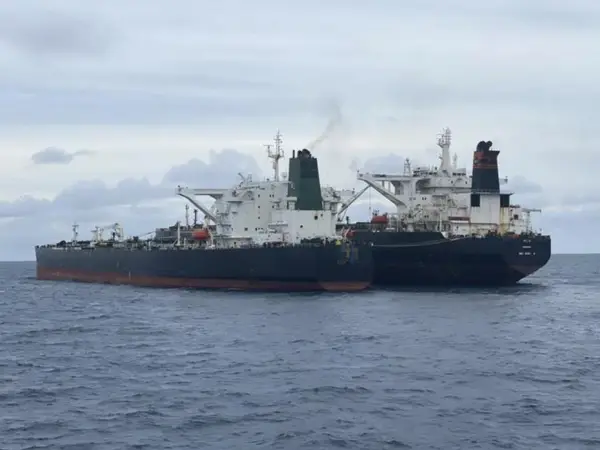Victims of the 9/11 terror attacks seek the seizure of Iranian crude oil from a tanker to help satisfy a $3.61 billion judgment against Iran over the attacks.
The request came in filings on Thursday with the US District Court in Manhattan.
The filings come as US investigators continue to probe the alleged involvement of the Suez Rajan, owned by Los Angeles-based private equity firm Oaktree Capital Management, in the sanctioned trade of Iranian oil as negotiations continue over Tehran’s nuclear deal with world powers.
Dozens of attack victims and their families said the Suez Rajan, idling in Southeast Asia, appeared to be carrying up to 1 million barrels of Iranian oil, violating US sanctions.
They said the oil should be seized and sold by the United States to help cover their February 2018 judgment against Iran over that country's providing material support to al-Qaeda related to the attacks. Iran has long denied such claims.
Oaktree has about $166 billion of assets under management. Neither the firm nor its London-based Fleetscape unit, which finances the Suez Rajan, immediately responded on Friday to requests for comment by Reuters.
The request came after the nonprofit United Against Nuclear Iran, which uses satellite images to track tanker movement, wrote Oaktree on February 15 that the Suez Rajan appeared to have taken on the oil from another tanker two days earlier.
Satellite photos from Planet Labs PBC of that area obtained by The Associated Press appeared to show the ships alongside each other. At sea, oil tankers can funnel crude between each other in a ship-to-ship transfer that typically sees boats in a similar position.
In separate Planet Labs satellite images from January 16, the Virgo appears to be loading crude oil from Iran’s Khargh Island, its main oil distribution terminal in the Persian Gulf. Tracking data separately shows the vessel near Khargh around that time before heading to Singapore.
Iran has increased its illicit oil exports since late 2020 with shipments estimated to top one million barrels a day, mostly going to China. The favorite method to hide the source of the shipment is ship-to-ship oil transfers and fake documents shwoing countries other than Iran as the origin of the cargo.
The Biden Administration has reportedly relaxed its sanctions enforcement to encourage Iran to come to an agreement in the nuclear talks in Vienna.
Even if the oil were seized, sales proceeds at current prices LCOc1 would cover only about 3% of the $3.61 billion judgment.
Victims said about $3.44 billion is outstanding, with the National Iranian Oil Co and National Iranian Tanker Corp, both under US sanctions, among the entities responsible to pay it.
Judgments against accused state sponsors of terrorism are often impossible to enforce.
The US government’s 9/11 Commission found Iranian officials met with al-Qaida leaders in Sudan in either 1991 or early 1992. The commission said al-Qaida militants later received training in Lebanon from the Shiite militant group Hezbollah, which Iran backs to this day.
Nearly 3,000 people died on September 11, 2001, when terrorist flew hijacked passenger planes into New York's World Trade Center, the Pentagon in northern Virginia, and a Pennsylvania field.
With reporting by Reuters and AP
